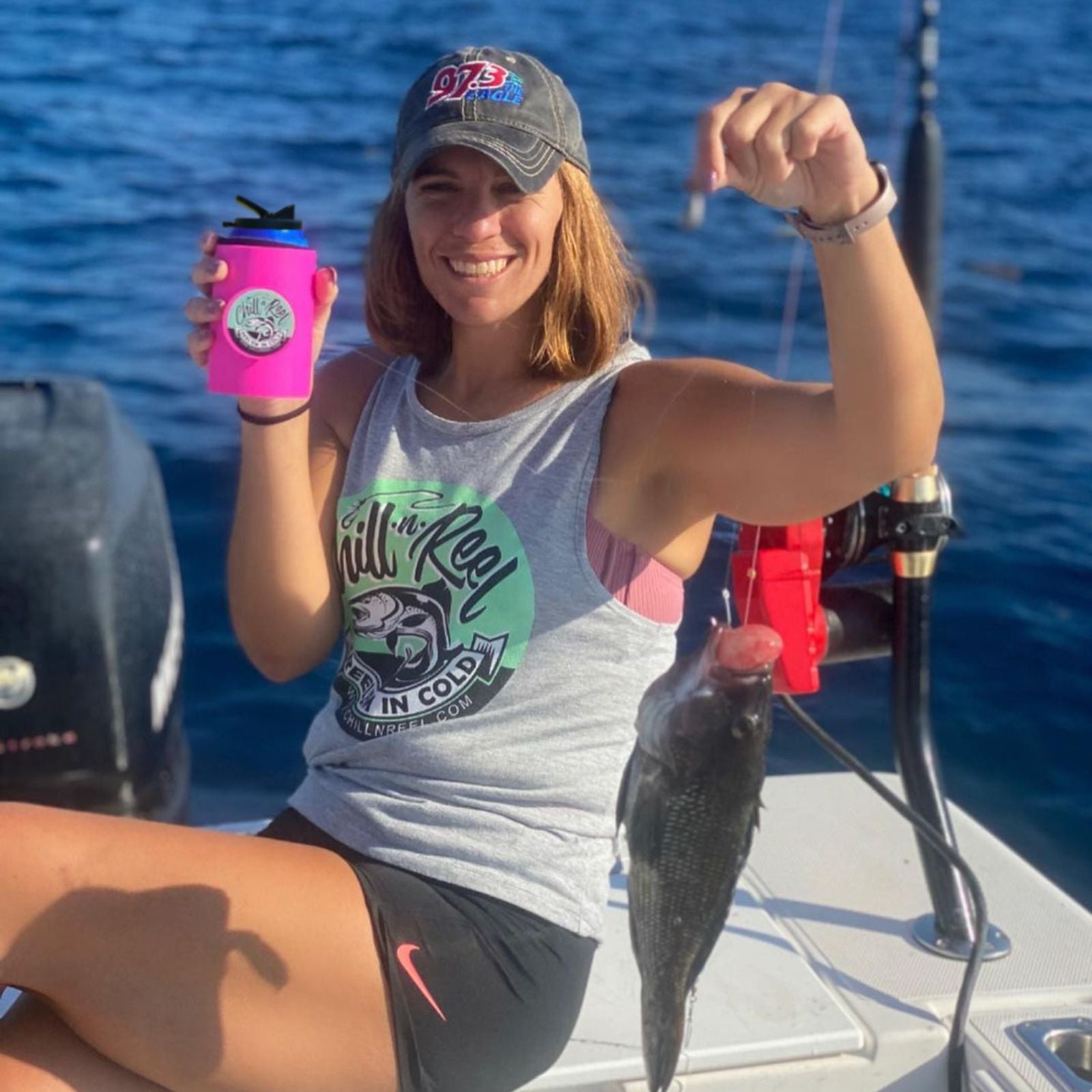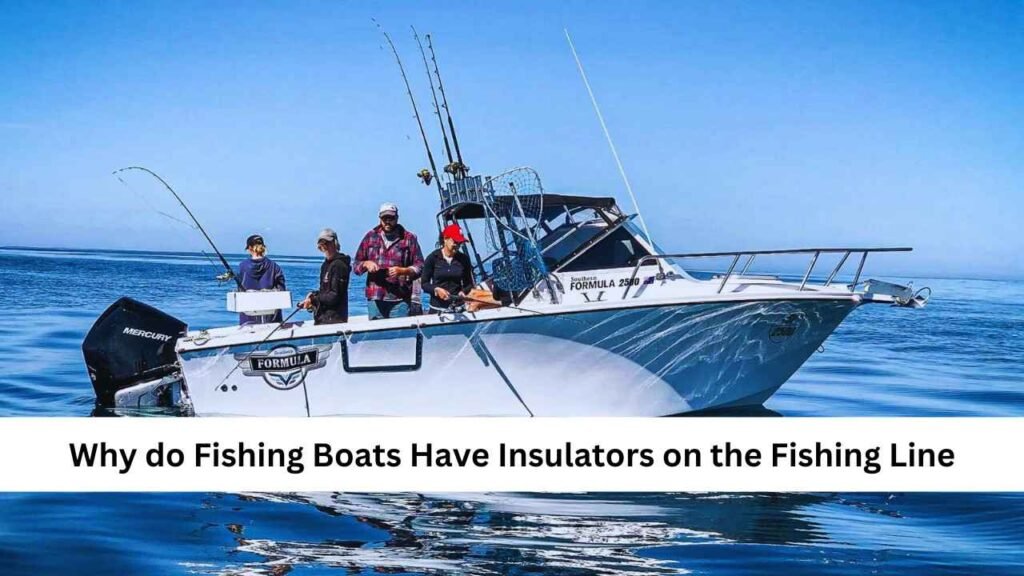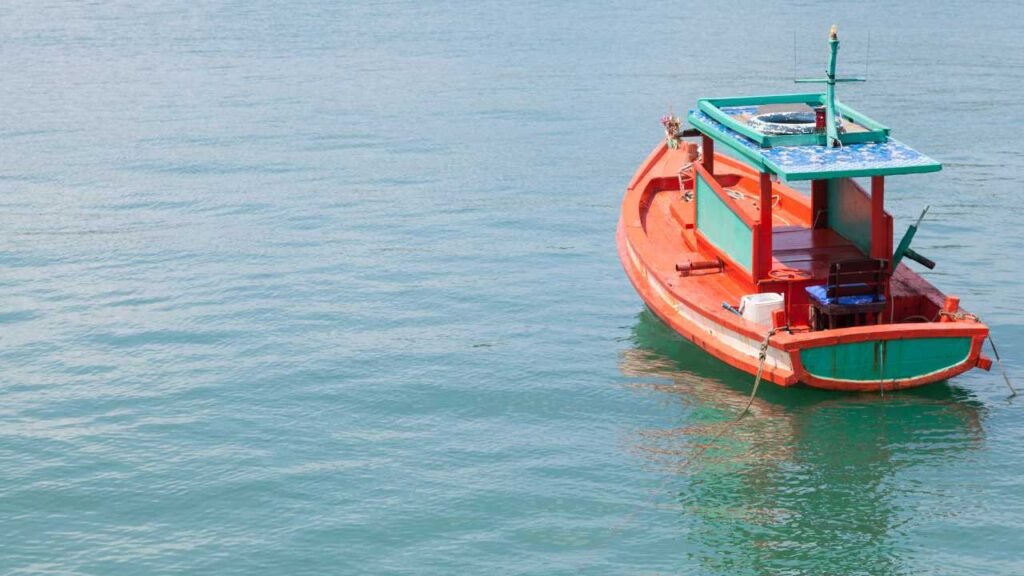Fishing boats use insulators on fishing lines to prevent electrical shocks and protect the crew from lightning strikes. Insulators also help maintain the integrity of the fishing line.
Fishing boats often operate in open waters, making them vulnerable to lightning. Insulators on fishing lines play a crucial role in safety by preventing electrical currents from traveling through the line and causing harm to the crew. These devices act as barriers, ensuring that any potential electrical discharge does not reach the fishermen.
Additionally, insulators help preserve the quality of the fishing line, preventing wear and tear caused by electrical exposure. This ensures a longer lifespan for the fishing equipment, making it a practical investment for fishing operations. Proper use of insulators can enhance both safety and efficiency on fishing boats.

Credit: chillnreel.com
Basic Function
Fishing boats often use insulators on their fishing lines. The basic function of these insulators is to provide safety and efficiency. Insulators help keep the line strong and prevent it from breaking.
How Insulators Work
Insulators are special materials that do not conduct electricity. They are placed on fishing lines to protect against electrical shocks. These shocks can come from electric fish or other sources in the water.
When a fishing line has an insulator, it stays safe from electric currents. This protection is crucial for the safety of the fishermen. Without insulators, the risk of electric shock would be higher.
Role In Fishing Efficiency
Insulators also play a key role in fishing efficiency. They help keep the fishing line strong and durable. A strong fishing line is less likely to break, even under heavy loads.
- Insulators reduce wear and tear on the line.
- They make the fishing line last longer.
- They help in maintaining the line’s strength.
Using insulators can lead to a more successful fishing trip. Fishermen can catch more fish without worrying about the line breaking. This makes insulators an essential part of fishing gear.
| Benefit | Description |
|---|---|
| Safety | Prevents electric shocks |
| Durability | Keeps the line strong and long-lasting |
| Efficiency | Helps in catching more fish |

Credit: captainspreferredproducts.com
Safety Benefits
Fishing boats use insulators on their fishing lines for safety. These insulators offer multiple benefits that protect both the crew and the equipment. Let’s explore the safety benefits of using insulators on fishing lines.
Preventing Electrical Hazards
Fishing boats often use electrical equipment. This equipment can make the fishing lines carry electrical currents. Insulators stop these currents from reaching the crew. This prevents electrical shocks. Insulators provide a barrier that keeps electricity from traveling along the fishing line. This makes the boat a safer place to work.
Protection Against Natural Elements
Fishing boats face harsh natural elements. Saltwater, wind, and rain can damage fishing lines. Insulators protect the lines from these elements. Saltwater is corrosive and can weaken lines. Insulators keep the lines strong. Wind and rain can also affect fishing lines. Insulators offer an extra layer of protection.
| Natural Element | How Insulators Help |
|---|---|
| Saltwater | Prevents corrosion and weakening of lines |
| Wind | Provides stability and strength |
| Rain | Keeps lines dry and reduces wear |
Insulators are essential for fishing boats. They offer safety benefits that protect both crew and equipment. By preventing electrical hazards and protecting against natural elements, insulators make fishing safer and more efficient.
Durability And Longevity
Fishing boats use insulators on their fishing lines for several reasons. One key aspect is durability and longevity. These insulators help to extend the life of the fishing line, ensuring it remains strong and reliable. Let’s explore how insulators contribute to the line’s durability and reduce wear and tear.
Enhancing Line Durability
Insulators protect fishing lines from harsh elements. Saltwater, sun, and rough surfaces can damage lines. Insulators act as a shield, keeping lines safe. This protective layer ensures the line stays strong longer. Fishermen can trust their gear to withstand tough conditions.
Reducing Wear And Tear
Insulators reduce friction on the fishing line. Less friction means less wear and tear. This helps the line last longer and stay effective. Fishermen save money by not replacing lines often. The insulators make the fishing experience smoother and more reliable.
| Benefit | Description |
|---|---|
| Protection | Insulators shield lines from saltwater and sun. |
| Friction Reduction | Less friction means less wear on the line. |
| Cost Saving | Lines last longer, saving replacement costs. |
- Durability: Extends the life of the fishing line.
- Protection: Shields the line from harsh conditions.
- Cost Efficiency: Reduces the need for frequent replacements.
Improved Catch Rates
Fishing enthusiasts often seek ways to improve their catch rates. One effective method is using insulators on fishing lines. These insulators play a crucial role in making the fishing process more efficient and successful.
Minimizing Line Visibility
Fish can see fishing lines, which can scare them away. Insulators help minimize line visibility. They make the line less noticeable underwater.
By reducing the line’s shine and glare, insulators make it blend with the water. Fish are less likely to detect a hidden line. This increases the chances of a successful catch.
Reducing Fish Detection
Insulators also reduce fish detection. Fish have sensitive senses and can detect foreign objects.
Insulators make the line smoother and more natural. This reduces the chances of fish sensing something unusual. When fish are less aware, they are more likely to bite the bait.
Using insulators is a simple yet effective strategy. It enhances the fishing experience and improves catch rates.
Environmental Impact
Fishing boats use insulators on their fishing lines for several reasons. One key reason is to reduce the environmental impact. This practice helps protect marine life and ecosystems.
Sustainable Fishing Practices
Sustainable fishing practices aim to conserve fish populations and marine habitats. Using insulators on fishing lines helps achieve this goal. Insulators reduce the risk of bycatch, which is the unintentional capture of non-target species. This helps maintain balanced marine ecosystems.
Insulators also prevent damage to coral reefs and underwater structures. This is crucial for the health of the ocean. Healthy coral reefs support a diverse range of marine life.
Reducing Marine Pollution
Insulators help in reducing marine pollution. They prevent fishing lines from breaking easily. Broken lines can turn into marine debris, which is harmful to sea creatures.
Using durable insulators means fewer lost lines in the ocean. This reduces plastic pollution and helps keep the waters clean.
Fishing lines with insulators are often more visible. This visibility helps other marine vessels avoid entanglement. It also reduces the risk of accidents and further pollution.

Credit: petsgators.com
Technological Advancements
Modern fishing boats use insulators on fishing lines for several reasons. These technological advancements improve safety and efficiency.
Innovations In Insulator Design
Insulator design has significantly evolved over the years. Early insulators were bulky and inefficient. Today, they are lightweight and more effective.
Modern insulators are made from high-tech materials. These include ceramics and advanced polymers. These materials offer better durability and insulation.
| Feature | Old Insulators | Modern Insulators |
|---|---|---|
| Material | Basic Plastics | Advanced Polymers and Ceramics |
| Weight | Heavy | Lightweight |
| Durability | Low | High |
Future Trends
The future of insulator technology looks promising. Researchers are developing smart insulators. These can detect and report issues in real-time.
Another trend is the use of eco-friendly materials. These materials aim to reduce the environmental impact. This is crucial for sustainable fishing practices.
- Smart insulators with real-time monitoring
- Use of eco-friendly materials
- Enhanced durability and efficiency
Practical Tips
Fishing boats often use insulators on their fishing lines. This helps to prevent electrical interference and maintain the integrity of the line. Below are some practical tips for choosing, maintaining, and caring for fishing line insulators. These tips will help you make the best use of your fishing equipment.
Choosing The Right Insulator
Choosing the right insulator for your fishing line is crucial. Here are some key factors to consider:
- Material: Insulators come in different materials like plastic, ceramic, and rubber. Choose a material that suits your fishing environment.
- Size: Ensure the insulator fits your fishing line properly. A loose or tight fit can affect performance.
- Durability: Opt for insulators that can withstand harsh weather conditions. Check for UV resistance and water-proof features.
Using the right insulator can enhance your fishing experience significantly. It ensures your equipment remains effective and safe.
Maintenance And Care
Proper maintenance and care of your fishing line insulators can prolong their lifespan. Follow these simple steps:
- Regular Inspection: Check insulators for cracks or wear and tear. Replace damaged insulators immediately to avoid issues.
- Cleaning: Clean insulators with mild soap and water. Avoid harsh chemicals as they can weaken the material.
- Storage: Store insulators in a cool, dry place. Keep them away from direct sunlight to prevent damage.
Maintaining your insulators is easy and ensures your fishing trips are hassle-free. A little care can go a long way in preserving the efficiency of your fishing line.
Fishing boats use insulators on the fishing line to prevent electrical hazards and improve safety. These insulators also help in reducing line tangles, ensuring a smoother fishing experience. Investing in quality insulators can enhance your fishing trips and protect your equipment.
Always prioritize safety and efficiency on your fishing adventures.
FAQs:
Why Do Fishing Lines Have Insulators?
Fishing lines have insulators to prevent electrical currents. This protects both the equipment and the fishers. It ensures safer and more efficient fishing operations.
How Do Insulators Work On Fishing Boats?
Insulators block electrical currents from traveling down the fishing line. This prevents damage to the equipment and ensures the safety of the crew.
What Benefits Do Insulators Provide On Fishing Lines?
Insulators enhance safety by preventing electrical hazards. They also protect the fishing gear from damage. This results in longer-lasting equipment and safer fishing trips.
Are Insulators Necessary For All Fishing Boats?
Yes, insulators are essential for modern fishing boats. They ensure the safety of the crew and protect the fishing equipment from electrical damage.



